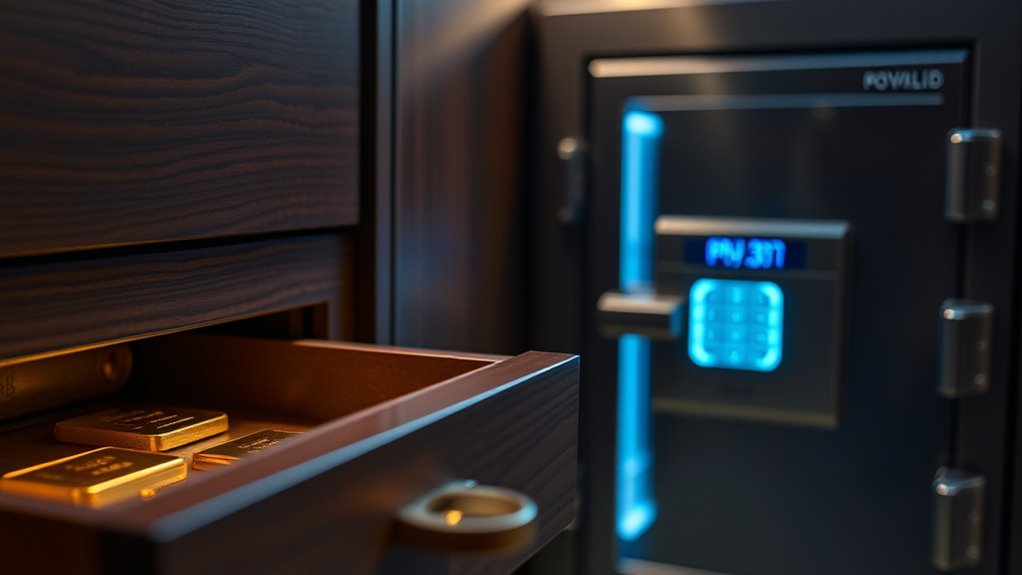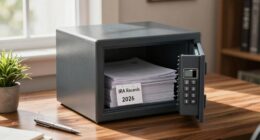When choosing between home storage and a depository for your gold, you must follow IRS rules that typically prohibit storing IRA-held metals at home and require using approved depositories for compliance. Home storage gives you control but exposes you to higher security and theft risks. Depositories offer better security and legal protection but involve ongoing fees. Understanding these rules and risks can help you make a smarter decision—more details will help you weigh your options effectively.
Key Takeaways
- IRS permits home storage for non-IRA metals but strictly requires depository storage for IRA-held precious metals.
- Depositories offer enhanced security, insurance, and IRS compliance, reducing theft and legal risks.
- Home storage involves safety risks, potential theft, and limited insurance coverage, requiring secure safes and security systems.
- Ongoing costs for depositories include storage fees and shipping, while home storage mainly incurs initial setup expenses.
- Proper coordination with custodians and adherence to IRS rules are essential to avoid penalties when storing metals.

When deciding where to store your gold, understanding the differences between home storage and using a depository is essential. If you have a self-directed IRA, IRS rules prohibit keeping those precious metals at home; instead, they must be stored at an IRS-approved depository. These depositories meet strict regulatory and operational standards to ensure compliance with IRS requirements. On the other hand, if the metals are not part of an IRA, you’re free to store them at home or in private safes without IRS restrictions. You can also receive metals as in-kind distributions from an IRA, allowing physical possession at home, but only after retirement or withdrawal events. To stay compliant, you’ll want to coordinate with your custodian, who ensures IRS reporting and helps minimize audit and penalty risks. Storage providers must meet specific regulatory standards, including documentation, insurance, and security protocols, to qualify as IRS-approved depositories. Security is another critical factor. Depositories invest heavily in physical security measures, including 24/7 surveillance, controlled access, alarm systems, and detailed audit trails. These features help safeguard your investment against theft and damage. Additionally, home storage security depends on your investment in safes, security systems, and discretion. While a sturdy safe can deter casual theft, it’s generally less secure than professional vaults. Home storage exposes you to risks like burglary, theft, and personal safety threats, which professional depositories are designed to mitigate through their advanced security infrastructure. Moreover, compliance with IRS rules is crucial to avoid penalties and legal issues related to asset storage. Depositories carry insurance policies covering loss, theft, and damage, providing further protection. Home insurance, on the other hand, may be limited or require additional riders to cover precious metals, often at higher premiums. Cost considerations differ as well. Home storage involves initial expenses for safes and security upgrades, with no recurring storage fees. However, it might incur indirect costs if theft occurs or if you need additional insurance. Depository storage charges ongoing fees—monthly or yearly—based on storage type, with additional fees for withdrawals or shipping. Insurance coverage from depositories is usually included, whereas insuring metals at home can be more expensive and complex. In brief, your choice hinges on balancing security, control, cost, and compliance. Both options have advantages and risks, but understanding the rules and potential pitfalls helps you make an informed decision about safeguarding your gold.
Frequently Asked Questions
How Does Insurance Coverage Differ Between Home Storage and Depositories?
When you store gold at home, your insurance might not fully cover theft or damage, requiring you to add a special rider or policy extension. In contrast, depositories typically provide insurance included in their service, protecting your assets up to a certain limit. You should verify coverage details with your insurer or depository to make certain your gold is adequately protected, no matter where you choose to store it.
Can I Access My Gold Instantly From a Depository?
Yes, you can access your gold instantly from a depository, almost like snapping your fingers and having your treasure appear! Usually, they offer quick retrieval options, sometimes within hours or even minutes, depending on the facility’s policies. You just need to give them proper notice, and they’ll prepare your gold for pickup or delivery, ensuring you get your assets without any frustrating delays.
What Are the Tax Implications of Storing Gold at Home?
Storing gold at home may not have immediate tax implications, but you should be aware of potential issues. If your gold appreciates considerably, you might owe capital gains tax when you sell it. Keep detailed records of your purchase prices and dates. Additionally, reporting large holdings might attract IRS scrutiny. Consult a tax professional to ensure you comply with all relevant laws and avoid unexpected liabilities.
How Do Storage Fees Compare Between Home Storage and Depositories?
You might find that storing gold at home involves minimal or no direct fees, but it costs you in security and convenience. Depositories charge monthly or annual fees that cover secure storage and insurance, which can add up over time. While home storage seems cheaper upfront, consider the ongoing costs and risks of protecting your gold yourself. Depository fees provide peace of mind, outweighing the apparent savings of at-home storage.
Are There Legal Restrictions on Storing Gold at Home in Certain Regions?
Yes, some regions have legal restrictions on storing gold at home. You might face regulations requiring you to declare your holdings or limitations on the amount you can store privately. It is crucial to check local laws to avoid penalties or confiscation. In certain countries, storing large quantities of gold at home could be illegal or require special permits, so always do thorough research before deciding where to keep your gold.
Conclusion
Choosing between home storage and a depository depends on your comfort level and risk appetite. While keeping gold at home feels like having a treasure chest at your fingertips, it also means you’re carrying the risk of theft or loss. On the other hand, a depository offers peace of mind but comes with fees and less immediate access. Remember, it’s better to be safe than sorry—think carefully about what suits your needs best.









